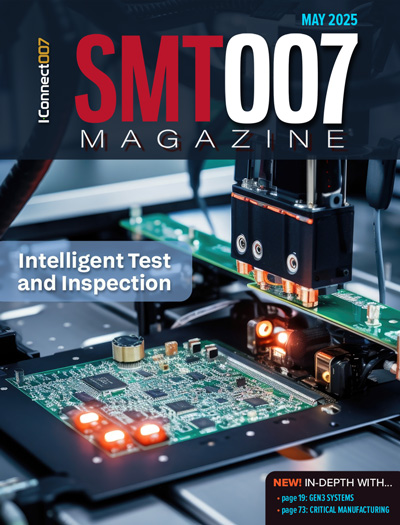-

- News
- Books
Featured Books
- smt007 Magazine
Latest Issues
Current Issue
Intelligent Test and Inspection
Are you ready to explore the cutting-edge advancements shaping the electronics manufacturing industry? The May 2025 issue of SMT007 Magazine is packed with insights, innovations, and expert perspectives that you won’t want to miss.

Do You Have X-ray Vision?
Has X-ray’s time finally come in electronics manufacturing? Join us in this issue of SMT007 Magazine, where we answer this question and others to bring more efficiency to your bottom line.

IPC APEX EXPO 2025: A Preview
It’s that time again. If you’re going to Anaheim for IPC APEX EXPO 2025, we’ll see you there. In the meantime, consider this issue of SMT007 Magazine to be your golden ticket to planning the show.
- Articles
- Columns
Search Console
- Links
- Media kit
||| MENU - smt007 Magazine
Machine Learning Can Predict the Mechanical Properties of Polymers
October 30, 2024 | ACN NewswireEstimated reading time: 2 minutes
Polymers such as polypropylene are fundamental materials in the modern world, found in everything from computers to cars. Because of their ubiquity, it’s vital that materials scientists know exactly how each newly developed polymer will perform under different preparation conditions. Thanks to a new study, which was published in Science and Technology of Advanced Materials, scientists can now use machine learning to determine what to expect from a new polymer.
Machine learning predicts the material properties of new polymers with high accuracy, providing a nondestructive alternative to conventional polymer testing methods. Machine learning predicts the material properties of new polymers with high accuracy, providing a nondestructive alternative to conventional polymer testing methods.
Predicting the mechanical properties of new polymers, such as their tensile strength or flexibility, usually involves putting them through destructive and costly physical tests. However, a team of researchers from Japan, led by Dr. Ryo Tamura, Dr. Kenji Nagata, and Dr. Takashi Nakanishi from the National Institute for Materials Science in Tsukuba, showed that machine learning can predict the material properties of polymers. They developed the method on a group of polymers called homo-polypropylenes, using X-ray diffraction patterns of the polymers under different preparation conditions to provide detailed information about their complex structure and features.
“Machine learning can be applied to data from existing materials to predict the properties of unknown materials,” Drs. Tamura, Nagata, and Nakanishi explain. “However, to achieve accurate predictions, it’s essential to use descriptors that correctly represent the features of these materials.”
Thermoplastic crystalline polymers, such as polypropylene, have a particularly complex structure that is further altered during the process of molding them into the shape of the end product. It was, therefore, important for the team to adequately capture the details of the polymers’ structure with X-ray diffraction and to ensure that the machine learning algorithm could identify the most important descriptors in that data.
The new method accurately captured the structural changes of commonly used plastic Polypropylene during the molding process into the end product. The new method accurately captured the structural changes of commonly used plastic Polypropylene during the molding process into the end product.
To that end, they analysed two datasets using a tool called Bayesian spectral deconvolution, which can extract patterns from complex data. The first dataset was X-ray diffraction data from 15 types of homo-polypropylenes subjected to a range of temperatures, and the second was data from four types of homo-polypropylenes that underwent injection molding. The mechanical properties analysed included stiffness, elasticity, the temperature at which the material starts to deform, and how much it would stretch before breaking.
The team found that the machine learning analysis accurately linked features in the X-ray diffraction imagery with specific material properties of the polymers. Some of the mechanical properties were easier to predict from the X-ray diffraction data, while others, such as the stretching break point, were more challenging.
“We believe our study, which describes the procedure used to provide a highly accurate machine learning prediction model using only the X-ray diffraction results of polymer materials, will offer a nondestructive alternative to conventional polymer testing methods,” the NIMS researchers say.
The team also suggested that their Bayesian spectral deconvolution approach could be applied to other data, such as X-ray photoelectron spectroscopy, and used to understand the properties of other materials, both inorganic and organic.
“It could become a test case for future data-driven approaches to polymer design and science,” the NIMS team says.
Suggested Items
Real Time with... IPC APEX EXPO 2025: Advancements in Inkjet Technology With Electra Polymers
04/14/2025 | Real Time with...IPC APEX EXPODon Monn from Electra Polymers discusses the evolution of inkjet technology since 2016, focusing on market changes and the reliability of inkjet products. He explains the additive inkjet process, which reduces waste and boosts efficiency. The conversation highlights Electra Polymers' strong market presence in North America and the importance of customer trust.
Electra's ElectraJet EMJ110G Powers Seamless Transition at Sunrise Electronics
04/11/2025 | Electra Polymers LtdElectra, in partnership with Allen Woods Associates, is proud to announce the successful deployment of its ElectraJet® EMJ110G Soldermask on KLA’s Orbotech Neos™ platform, now running production at Sunrise Electronics in Elk Grove Village, Illinois.
TCT Circuit Supply and Electra Polymers Announce New Strategic Partnership
03/12/2025 | Electra Polymers LtdTCT Circuit Supply (TCS) is excited to announce a new strategic partnership with Electra Polymers, a global leader in advanced specialty polymer products
Technica USA and Electra Polymers: Driving Success in Ink Jet Solder Mask Across North America
02/27/2025 | Technica USATechnica and Electra Polymers have achieved remarkable success in the ink jet solder mask market. Electra Polymers is the dominant force in North America, holding an overwhelming market share north of 80% with its ElectraJet® EMJ110 solder mask.
Geena Bowen Joins Electra Polymers as Inkjet LaboratoryTechnician
02/24/2025 | Electra Polymers LtdElectra Polymers Ltd, a global leader in specialty materials for the PCB industry, is delighted to welcome Geena Bowen to its inkjet development team as an Inkjet focused laboratory technician. Geena brings a strong scientific background with a distinction in MSc Biomedicine and a First-Class BSc (Hons) in Biomedical Science further enhancing Electra’s capabilities in advancing sustainable PCB solutions.


